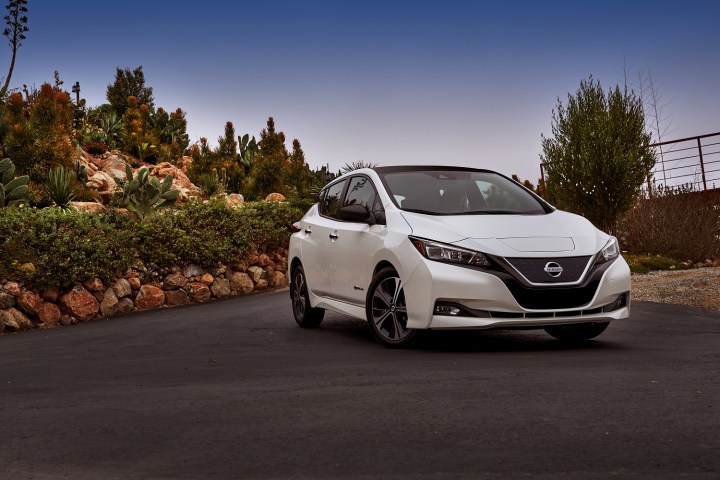
Tech features
We’ve said this before — tech is the new measuring stick in the automotive industry, especially when it comes to electric cars. Lane-keeping assist with lane departure warning and automatic braking are available on the Bolt, but they’re bundled into a $495 option package only offered on the Premier trim, which costs $41,780. Even fully loaded, the Bolt comes with fewer tech features than its rival.
The Leaf is the first car offered with Nissan’s ProPilot Assist technology. It’s an optional suite of electronic driving aids that assists users when driving becomes tedious or dangerous. It controls braking, acceleration, and steering if the car is traveling on a single-lane highway between 18 and 62 mph. ProPilot Assist is a baby step towards full autonomy, which is Nissan’s end goal. Pricing information hasn’t been announced yet because the Leaf is so new — expect full details in the coming months.
Performance and range
The Bolt’s 60-kWh lithium-ion battery pack provides up to 238 miles of range. The electric motor zaps the front wheels with 200 horsepower and 266 pound-feet of torque. Accelerating from zero to 60 mph takes a brisk 6.5 seconds. The Bolt is certainly not a Volkswagen GTI, but we found it to be surprisingly zippy around town.
While the Bolt qualifies for the coveted “long-range EV” label, we can’t say the same thing about the Leaf; usability is what truly sets the Chevrolet and the Nissan apart. The Leaf’s 40-kWh battery pack only provides enough electricity for up to 150 miles of range. Electricity reaches the front wheels via an electric motor rated at 147 horsepower and 236 pound-feet of torque. Nissan promises that a second version of the Leaf with more power and more range will arrive a little bit later in the production run, and it will pose a much bigger threat to the Bolt, but a more specific time frame hasn’t been set yet.
Interior and exterior design
The Bolt and the Leaf fulfill similar missions in the zero-emissions world, and their respective designs reflect that. The Chevrolet is a tall, crossover-esque hatchback with plastic cladding that adds a faux rugged touch to its look. Don’t let it fool you; the Bolt isn’t going anywhere near a trail. The Leaf is more of a conventional hatchback that just happens to be electric.

The Bolt’s front end falls in line with Chevrolet’s recent design language. Inside, you’ll find a pretty standard cabin layout with a large touchscreen on the center console, a three-spoke steering wheel, and a digital instrument cluster that’s fully configurable. Curved horizontal lines emphasize the cabin’s width.
Nissan finally ditched the original Leaf’s alien-esque design in favor of more conventional styling, much to the satisfaction of anyone who has see one on a regular basis. Look inside and you’ll find a three-spoke steering wheel, a large touchscreen for the infotainment system, and a configurable digital instrument cluster. Experiencing déjà vu? Both the Bolt and the Leaf were developed with an emphasis on user-friendliness, not luxury. If a premium electric car is what you’re after, we suggest you check out the Tesla Model 3.
Chevrolet’s first full-production electric car offers 16.9 cubic feet of trunk space behind the rear seats, or 56.6 cubic feet with the rear seats folded flat. Nissan hasn’t revealed the Leaf’s cargo capacity yet.
Pricing and availability
The Bolt is available right now from Chevrolet dealers nationwide – no reservation required, and no waiting in a virtual line to get one. Pricing starts at $37,495 before federal and local incentives are factored in, which makes it considerably more expensive than the Leaf.
Nissan expects the first examples of the 2018 Leaf will reach showrooms early next year. Pricing starts at $29,990 before incentives are factored in, meaning it’s actually cheaper than the outgoing first-generation model. That’s a good chunk less than the Bolt, but be prepared to visit a charging station more often.
Editors' Recommendations
- The best electric cars you can buy in 2023
- The best EV charging apps help you find the right station for any electric car
- Nissan employs certified smellers to check the odor of its new cars
- Chevy will pay charging-station installation costs for 2022 Bolt EV buyers
- 2022 Chevy Bolt EV and Bolt EUV: More electric cars to love



